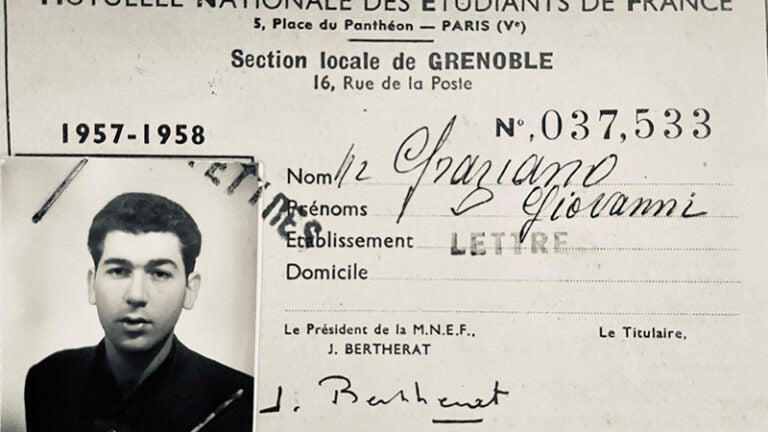
Celebrating 75 years of our fabulous Fulbrights
On Aug. 1, 1946, President Harry S. Truman signed the act that launched the Fulbright program, which is designed to enhance mutual understanding and help people and nations work together toward common goals by enabling students to study and conduct research worldwide.
USC has been a top producer of Fulbrights for nine years running, many of them students at the USC Dornsife College of Letters, Arts and Science. Here, meet six USC Dornsife Fulbright scholars from the 1950s to the 2010s and find out what motivated them to apply, what they got out of the experience and how it changed their lives.
1950s
The Globe-Trotter
John Graziano (B.A., French, 1955; M.A., Slavic studies, 1972)
1957 Fulbright Scholar: France (French Linguistics)
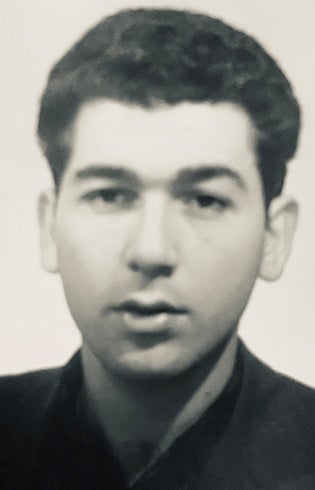
John Graziano ’55 studied in France as part of his 1957 Fulbright Scholarship. (Image: Courtesy of John Graziano.)
When John Graziano’s professors at USC Dornsife encouraged him to apply for a Fulbright scholarship, he thought he’d never get it.
“But lo and behold, I did get it. And it changed my whole life,” says Graziano, now 88, from his home in Studio City, California.
The French major had always longed to travel but his parents, Sicilian immigrants, weren’t keen for their son to go to Europe. “They knew I was a European at heart and were probably afraid I might not come back,” Graziano chuckles.
Winning a Fulbright to study French linguistics in Grenoble, France, opened the door to a lifetime of travel for Graziano and provided the impetus to his future career as a language teacher.
He since traveled to more than 80 countries worldwide and taught French, Italian, Russian and Spanish at Los Angeles high schools, Los Angeles City College and California State University, Northridge.
“I was very fortunate to teach in very good schools, academic schools. And because of all of this experience that I had, I was able to bring a lot of things into the classroom that I never would have been able to do otherwise,” he says.
Graziano also spent a couple of years living in Georgia in the then-Soviet Union before studying at Moscow University, and he met family members in Italy and made many friends around the world.
Graziano is still involved in the Fulbright program. This year he made a gift to USC to create a foundation to provide aid to young people wishing to travel. He plans to name the foundation after three late USC Dornsife professors he describes as “my guiding light:” René Bellé, Arthur Knodel and Jacques Poujol.
“The Fulbright absolutely changed my world view. I gained a deep understanding of myself that I never would have had otherwise. I wish I had two or three lifetimes so that I could do it all again.”
1970s
The Historian
Joseph Joyce (M.A., history, 1969; Ph.D., history, 1974)
1970 Fulbright Scholar: Spain (Latin American and Caribbean History)
More than 50 years ago, while he was in Spain researching Latin American and Caribbean history, Fulbright scholar Joseph Joyce traveled to Valladolid, a provincial capital north of Madrid, to access materials at the Archivo General de Simancas that were critical to his doctoral dissertation. The archive was housed in a former castle and required crossing a bridge over a now dry moat, Joyce remembers.
Joyce, the recipient of a Fulbright grant for dissertation research, had traveled to Spain in December 1970 with his wife and still recalls how supportive the Fulbright commission in Madrid was to the young couple.
“They proved extremely helpful in finding us housing, providing the necessary written introductions for the use of Spanish libraries and archives, offering survival tips, and even assisting my wife in securing employment at a Spanish university,” he says.
In Madrid, Joyce’s research on the period of the unification of the Spanish and Portuguese thrones from 1580–1640 was centered at Spain’s national library and national archive. He also spent three months in Lisbon, accessing archives and libraries in the Portuguese capital.
After earning his Ph.D., Joyce worked in higher education in Connecticut and Massachusetts, spending the last 10 years of his career as director of Verizon’s New England Next Step Program — a collaboration between the telecommunications giant and its unions on an associate degree program for technicians.
Joyce says his Fulbright and USC’s John Randolph Haynes and Dora Haynes Foundation Research Fellowship allowed him to do the research necessary to earn his Ph.D. — enabling him to pursue his career.
“The experience of living and researching abroad widened my understanding of other cultures and peoples and significantly broadened my classroom and book learning,” he says. “In short, it was unforgettable.”
1980s
The Diplomat
Alfred Nakatsuma (M.A., economics, urban and regional planning, 1986)
1984 Fulbright Scholar: Peru (economics and urban and regional planning)
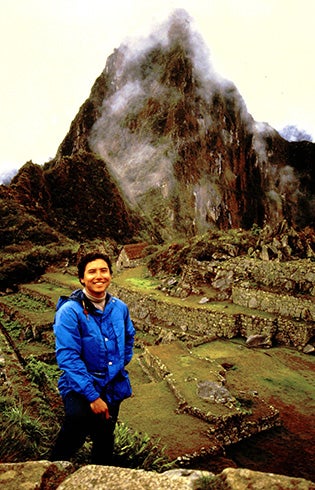
Alfred Nakatsuma ’86 visits Machu Pichu during his 1984 Fulbright Scholarship in Peru. (Photo: Courtesy of Alfred Nakatsuma.)
Alfred Nakatsuma’s goal was always to help alleviate poverty in developing countries. But after family illness prevented his plan to join the Peace Corps and his father insisted his son work first to pay off college debts, Nakatsuma says, “I did what he asked, but as soon as I finished three years of work and two years of graduate study at USC, I applied for a Fulbright.”
Nakatsuma chose Peru. “It was an ideal country to work in because there were economics, engineering and planning issues.”
As a Fulbright scholar, Nakatsuma traveled the entire Peruvian coast, from Ecuador to Chile, analyzing the country’s irrigation network on behalf of the Peruvian government and evaluating how it could be improved.
“In the course of my travels, I got to see an incredible and spectacular country with an amazing history,” he says.
After his Fulbright, Nakatsuma snagged a contract to manage a $200 million U.S. government infrastructure program in Bolivia. A few years later, USAID invited him to join the U.S. government as a diplomat. Nakatsuma, who retired in 2019 and now lives in Los Angeles, spent the rest of his 30-year-plus career in this role, focusing exclusively on the development of poor countries.
His dreams had come true — thanks, he says, to his Fulbright.
“I always wanted to work in a developing country, but I didn’t have any experience in that area. Fulbright provided that. It was the biggest influence on my life, shaping everything: where I’ve lived, who I’ve worked with, what I’ve done and what I’ve studied.”
1990s
The Regional Economist
Zagros Madjd-Sadjadi (Ph.D., political economy and public policy, 1996)
1994 Fulbright Scholar: Canada (political science)
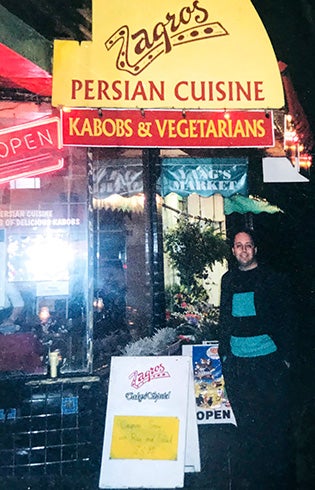
Zagros Madjd-Sadjadi ’96 visits a restaurant bearing his name in Vancouver, British Columbia, during his 1994 Fulbright Scholarship in Canada. (Photo: Courtesy of Zagros Madjd-Sadjad.)
Regional economist Zagros Madjd-Sadjadi, professor of economics at Winston-Salem State University, North Carolina, and former chief economist of San Francisco, used his Fulbright scholarship to research his doctoral dissertation on the impact of globalization on Canada’s provinces.
“The best place to study regions, I found, was Canada, because it’s one of the first places where this concept of an economic region developed,” said Madjd-Sadjadi, who spent his Fulbright as a visiting scholar at the Institute of Intergovernmental Relations at Queen’s University in Kingston, Ontario.
“I really got a good look at another culture and another political and economic system in a way that you just can’t do from California,” he says.
After earning a Ph.D., Madjd-Sadjadi worked as a California state economist, in charge of labor statistics and research. He then spent three years as a lecturer at the University of the West Indies at Mona in Kingston, Jamaica, before being appointed Chief Economist of the City and County of San Francisco. In 2006, he joined Winston-Salem State University.
He also works as a consultant with clothing giant Hanesbrands, traveling to plants worldwide to perform compensation studies.
He says the biggest lesson he learned from his Fulbright is the importance of being on the ground.
“It makes you a better researcher and a better scholar because you can start understanding why things are the way they are instead of trying to impose your preconceived notions on them,” he argues. “You can’t just do things from your ivory tower. You have to talk to people. I learned that from my time in Canada and it has informed my entire career.”
2000s
The Lawyer
Meher Talib (B.A., international relations, 2008)
2008 Fulbright Scholar: Morocco (sociology)
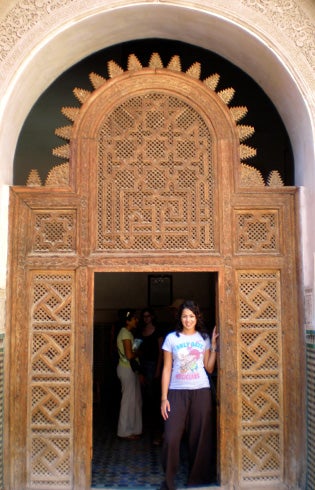
Meher Talib ’08 explores Asilah during her Fulbright Scholarship in Morocco. (Photo: Courtesy of Meher Talib.)
After developing an interest in Middle East politics at USC Dornsife, Meher Talib applied for a Fulbright scholarship to study Tunisia’s heavy metal music scene.
“I was interested in what you can learn about politics and society from understanding popular music movements,” she says.
When Tunisia withdrew its Fulbright participation, Talib was offered the option of traveling to Morocco instead and switched her research focus to studying the country’s emerging female hip-hop artists.
Talib had expected wide support among the country’s youth and was surprised to discover that reactions were broadly mixed among both young men and women in Morocco. “It was an important lesson not to approach research with your own American biases but to really take the opportunity to learn from the society and culture you’re in,” she says.
“Being abroad teaches you to be cognizant of how many different ways you can approach or look at an issue or problem.”
Realizing that Morocco’s hip-hop artists often rapped about recent changes in the country’s Moudawana laws to make them less restrictive and repressive to women sparked Talib’s interest in law.
After her Fulbright, Talib interned in Malaysia with the United Nations High Commissioner for Refugees where she became more deeply interested in refugee and asylum law.
After earning a degree in global politics from the London School of Economics and a law degree from Georgetown University, Talib, who now lives in New York, serves as in-house counsel at a global pharmaceutical company.
“I’m so grateful that I challenged myself to become immersed in another country and culture,” she says. “The experience of being abroad and connecting with people I wouldn’t have had the opportunity to connect with otherwise is so valuable to personal growth and helped me become successful in the international environment in which I now work.”
2010s
The Medical Student
Sophie Wix (B.A., health and human sciences, 2018)
2018 Fulbright Scholar: United Kingdom (Medicine Sciences)
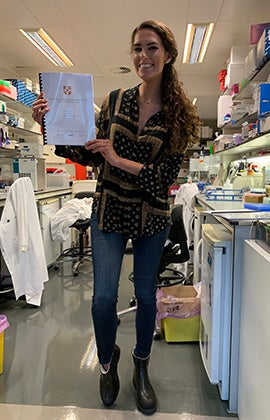
Sophie Wix displays her research report produced during her Fulbright Scholarship in the U.K. (Photo: Courtesy of Sophie Wix.)
While pursuing her undergraduate degree at USC Dornsife, Sophie Wix had the opportunity to study abroad for a summer at the University of Cambridge and was immediately drawn to the vibrant intellectual community there.
“I was part of the summer Pembroke-King’s Programme, which allowed me to live and study like a true Cambridge student — weekly formal dinners (like Hogwarts!), afternoon tea and punting — as well as complete a supervised thesis and courses.”
Her thesis on the human gut microbiome and cancer from that summer won the USC Global Scholars Prize in 2018.
“My passion for science and medicine really came alive there, and I knew I wanted to return,” Wix says.
Her research on treatment-resistant breast cancer at the Convergent Science Institute in Cancer at the USC Michelson Center for Convergent Bioscience prepared her to further her studies at Cambridge with one of the world’s most prominent breast cancer physician-scientists.
“It was a tremendous privilege to have been selected as a Fulbright scholar in support of my studies abroad,” says Wix, who became USC’s first Trojan to earn a Fulbright scholarship to the United Kingdom.
Wix had the unique opportunity to present her work from Cambridge at the 65th Annual Fulbright Conference in Berlin.
“The Fulbright scholars I met really are luminaries of this generation and visionaries for the future,” she says. “The Fulbright opened the doors to my future as a physician, scientist and activist.”
Currently a third-year medical student at the TCU and UNTHSC School of Medicine in Fort Worth, Texas, Wix says that after interacting with health care systems and research consortia in Europe, she has learned many ways that the U.S. can improve its own health system and global research partnerships.
“Though I’m still uncertain of my medical specialty, whatever I do my goal is to be able to deliver health care and advanced research trials to those populations who have long been underrepresented in medicine,” she says.
Applying for awards, fellowship and honors
Experts at USC Academic Honors and Fellowships help USC students seeking competitive fellowships and other prestigious programs by offering individual advisement, writing workshops, campus review committees and mock interviews. Students interested in applying to the Fulbright or similar programs may contact them at ahfstaff@usc.edu.